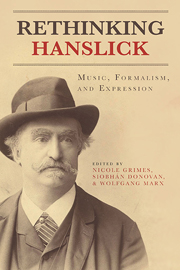Book contents
- Frontmatter
- Contents
- Foreword by Mark Evan Bonds
- Acknowledgments
- Abbreviations
- Chronology
- Introduction
- Part One Rules of Engagement
- Part Two Liberalism and Societal Order
- Part Three Memoirs and Meaning in Social Contexts
- 9 The Critic as Subject: Hanslick's Aus meinem Leben as a Reflection on Culture and Identity
- 10 “Faust und Hamlet in Einer Person”: The Musical Writings of Eduard Hanslick as Part of the Gender Discourse in the Late Nineteenth Century
- 11 Body and Soul, Content and Form: On Hanslick's Use of the Organism Metaphor
- Part Four Critical Battlefields
- Selected Bibliography
- List of Contributors
- Index
10 - “Faust und Hamlet in Einer Person”: The Musical Writings of Eduard Hanslick as Part of the Gender Discourse in the Late Nineteenth Century
from Part Three - Memoirs and Meaning in Social Contexts
Published online by Cambridge University Press: 05 July 2013
- Frontmatter
- Contents
- Foreword by Mark Evan Bonds
- Acknowledgments
- Abbreviations
- Chronology
- Introduction
- Part One Rules of Engagement
- Part Two Liberalism and Societal Order
- Part Three Memoirs and Meaning in Social Contexts
- 9 The Critic as Subject: Hanslick's Aus meinem Leben as a Reflection on Culture and Identity
- 10 “Faust und Hamlet in Einer Person”: The Musical Writings of Eduard Hanslick as Part of the Gender Discourse in the Late Nineteenth Century
- 11 Body and Soul, Content and Form: On Hanslick's Use of the Organism Metaphor
- Part Four Critical Battlefields
- Selected Bibliography
- List of Contributors
- Index
Summary
Reading Hanslick's autobiography Aus meinem Leben (1894), one could be forgiven for thinking that both a public discourse on gender and the women's movement were completely absent in Vienna during the latter part of the nineteenth century; for nowhere does Hanslick refer to this socially and politically rousing topic. Events such as the Prater massacre in August 1848, which witnessed the brutal suppression of a protest by female workers against a 25 percent pay cut, go completely unmentioned. Had this been pointed out to Hanslick, presumably he would have retorted that his job as music critic had nothing to do with the gender debate; his task was to comment on and judge musical compositions, concerts, and performing artists rather than sociopolitical issues. In other words, his area of responsibility was not politics, but the music and arts pages. As Carl Dahlhaus has pointed out, however, “literature about music is no mere reflection of what happens in the musical practice of composition, interpretation, and reception,” but rather the material that is perceived acoustically only becomes an actual aesthetic event (i.e., music) by virtue of its reception—by being discussed. I would apply this further and argue that the reception of and writing about music are constitutive elements of music. The extent to which the discussion of music is affected by contemporary thought processes is something that Dahlhaus explains elsewhere: “The general level of knowledge of a particular period affords the author several different formulations, and these are no less important for the content and validity of his insights than for his observations on the music itself.
- Type
- Chapter
- Information
- Rethinking HanslickMusic, Formalism, and Expression, pp. 212 - 235Publisher: Boydell & BrewerPrint publication year: 2013



